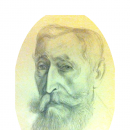Main menu
- ‘Abdu’l-Bahá’s Journey
- World Peace
- Stopping Racism in America
- Empowerment of Women
- More Principles...
- Prayer for America
John D. Bosch (1855-1946)
“John David Bosch was born at Neu-St. Johann, Canton St. Gall, Switzerland, on August 1, 1855. His parents were Michael Johann Bosch and Maria Biegmann; he had three brothers and three sisters, and was his parents’ fifth child. When he was nine, his mother died, and he was then brought up by his oldest sister, whom he loved all his life. After attending elementary and “repletitionary” school in Neu-St. Johann, he left Switzerland with a sister and her husband (the Zuberbuhlers), arrived in America in 1879, and went to Amboy, Nebraska where on arrival the Zuberbuhlers purchased a farm. He practiced his trade of cooper, “helped with the building of the railroad, and also farmed.” He was in Los Angeles, California between 1884 and 1889, and became a citizen of the United States in Los Angeles County in 1887, the document also being registered in Sonoma County in 1892. He married Kathe Krieg in ‘85 or ‘86, the marriage ending in divorce around ‘89. It was about this period that he went to Germany, France and Spain to study winemaking. After holding various good positions in the Valley of the Moon, he purchased the thirty-five acres constituting the original extent of his Geyserville property on October 26, 1901 from Emily B. Smith of Geyserville.
In 1905, John became a Bahá’í, his teachers being Mrs. Beckwith, Mrs. Goodall, Mrs. Cooper and Thornton Chase. John was delegate from California and Honolulu to the first Bahá’í Temple Unity Convention, Chicago, March 21, 1906. In April, 1912, when superintendent of the Northern Sonoma County Wineries, he went East to be with ‘Abdu’l-Bahá, and on his return was instrumental in appealing to the Master to visit the West. He was Thornton Chase’s literary executor. On January 19, 1914 he married Louise Sophie Stapfer of Zurich, Switzerland, in San Francisco. In 1920, with Louise, he left for Tahiti in March, pioneering there and leaving in September. In November 1921, he and Louise were present in Haifa at the time of the Master’s passing. Appointed by the National Spiritual Assembly with two other to locate a place for thee establishment of a center “along the lines of Green Acre” John offered his property for this purpose, the institution beginning its functions in 1927. From this period on, he continued to serve in many ways until his long, final illness. He passed away July 22, 1946, and was buried in Olive Hill cemetery, Geyserville, following a befitting memorial service held July 24 in the Bahá’í Hall, Geyserville School. Under the auspices of the National Spiritual Assembly, memorial service was also held for him in the Bahá’í House of Worship, November 24. His tomb is covered with a long plaque (the work of John Quinn) made of hammered bronze and bearing the Greatest Name. The underbrush has all been cleared away, exposing a whole new range of mountains, the western mountains that shut Geyserville off from the sea. When we saw the place recently, we knew we were watching one of the loveliest views in the world. It was a soft autumn day, “The mountains seem so near,” Louise said dreamily. “That means rain.” (Marzieh Gail, Bahá’í News July, 1974)
The drawing used here was completed in 1938 by the famous artist Mark Tobey. It was donated to the NSA of the USA by Joyce Lyon Dahl and resides in the US Bahá’í National Archives. This drawing was photographed by Duane Troxel, 2012.









